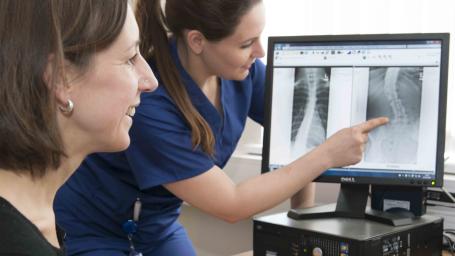New research from the AERATOR study suggests that respiratory support used to treat patients with severe COVID-19 is associated with less aerosol emission than breathing, speaking or coughing.
In August 2020, the AERATOR group was awarded an NIHR-UKRI grant to study a range of potential aerosol generating procedures (AGP's) commonly performed across the NHS. Currently policies around these procedures mean the use of full (FFP3) PPE and often lengthy waits between procedures to allow for cleaning and adequate room airflow changes to occur. This has led to increased waiting times and the cancellation of some NHS services across the UK. AERATOR 'AERosolisation And Transmission Of SARS-CoV-2 in Healthcare Settings' has received urgent public health (UPH) priority to support the research team to rapidly deliver the study.
Nick Maskell, Professor of Respiratory Medicine at Bristol Medical School: Translational Health Sciences (THS) and NBT, and chief investigator for the study, said:
"It is amazing that in just six months after accepting this award, we are able to share our first set of results on respiratory support. This is a great collaborative effort between experts at the the Bristol Aerosol Research Centre (BARC) and a range of specialists at North Bristol NHS Trust."
Jonathan Reid, Director of Bristol Aerosol Research Centre (BARC) and Professor of Physical Chemistry in the School of Chemistry at the University of Bristol, added:
"Aerosols and droplets are the primary vehicle for transmitting the coronavirus. Measuring how much aerosol is generated by clinical procedures, compared to breathing and coughing, is a crucial first step to identify which processes could pose a risk of infection to clinicians and patients."
Risk of generating aerosols from SARS-CoV-2 directly informs an organisation about acute healthcare and PPE guidance. Continuous positive airway pressure (CPAP) and high-flow nasal oxygen (HFNO) are widely used for oxygen delivery and respiratory support for patients with severe COVID-19, and both are considered high-risk aerosol generating procedures. However, very little is known about the aerosols produced during oxygen delivery and respiratory support.
The AERATOR study team looked at whether oxygen delivery systems, CPAP and HFNO, used routinely on medical wards and intensive care units, generate aerosols. Healthy volunteers were recruited to breathe, speak, and cough in ultra-clean, laminar flow theatres followed by using oxygen and respiratory support systems. Aerosol emission was measured using two methodologies, simultaneously. Hospitalised patients with COVID-19 were also recruited and aerosol emissions measured during breathing, speaking, and coughing. This is the first-time measurements from both healthy volunteers and COVID-19 patients have been taken.
The study team found in healthy volunteers, CPAP is associated with less aerosol emission than breathing, speaking or coughing. Aerosol emission from the respiratory tract does not appear to be increased by HFNO. Although direct comparisons are complex, coughing appears to generate significant aerosols in a size range compatible with airborne transmission of SARS-CoV-2. As a result, the risk of SARS-CoV-2 aerosolisation is likely to be high in all areas with COVID-19 patients.
Dr Florence Gregson, Visiting Research Associate in the School of Chemistry and Dr Fergus Hamilton, Honorary Research Fellow in the Bristol Medical School: Population Health Science (PHS), and joint first authors on the study, explained:
"Using state of the art sampling techniques, and a laminar flow theatre to reduce background aerosol, we measured the amount of aerosol generated when breathing, talking and coughing whilst wearing a surgical mask, continuous positive airways pressure (CPAP) mask or high flow nasal oxygen (HFNO)."
Dr James Dodd, Consultant Senior Lecturer in Respiratory Medicine at Bristol Medical School: (THS) and NBT, and senior author on the respiratory area of the study, said:
"We were delighted to work with world-leading aerosol scientists to design and deliver this study which provides much needed, high quality data on the risk of aerosol emissions when caring for patients with severe COVID-19.
Our study has shown that the use of CPAP actually reduces aerosol transmission rather than increases it. Although direct comparisons are complex, cough appears to generate significant aerosols in a size range compatible with airborne transmission of SARS-CoV-2. This will inform policy makers on appropriate PPE and ventilation in different hospital settings and ultimately how we can best protect our patients and staff."
The findings from the study have been presented to the NIHR Aerosol Generating Procedures (AGP) Task and Finish Group that feeds into the AGP subgroup which reports to SAGE. The AERATOR team hope these results will assist in updating central policies on the use of PPE in hospital settings.
To find out more about the study’s findings, read the full pre-print report.
Please note this is a preprint, so it is a preliminary piece of research that has not yet been through peer review and has not been published in a scientific journal – so this is early data.




